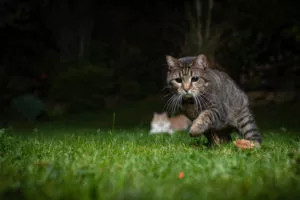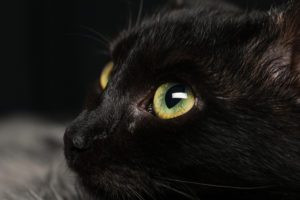Are cats afraid of the dark? Absolutely, cats can be scared of the dark, though their remarkable night vision helps them navigate low-light environments. At solcat.net, we delve into the fascinating world of feline behavior, exploring the reasons behind this fear and offering practical solutions to ensure your cat feels safe and secure. Discover how to create a comforting environment with optimal lighting, safe spaces, and engaging activities for your furry friend.
1. Can Cats Actually See in the Dark?
Yes, cats can see in the dark, but not in complete darkness. Their eyes are specifically adapted to low-light conditions. This adaptation is crucial, as cats are crepuscular animals, meaning they are most active during dawn and dusk.
Cats have evolved to be exceptional hunters in low-light environments. Their eyes possess unique features that enhance their ability to see in dim conditions:
- Tapetum Lucidum: This reflective layer behind the retina acts like a mirror, bouncing light back through the eye, giving photoreceptors a second chance to detect it. This is why cats’ eyes appear to glow in the dark.
- High Rod Cell Density: Cats have a higher concentration of rod cells in their retinas compared to humans. Rod cells are responsible for detecting motion and seeing in low light.
- Large Pupils: A cat’s pupils can dilate much wider than human pupils, allowing more light to enter the eye.
- Slit-Shaped Pupils: These pupils can close very tightly in bright light, protecting the sensitive retina, and open wide in dim light to maximize light intake.
 Cat looking in the dark with glowing eyes
Cat looking in the dark with glowing eyes
2. Can Kittens See in the Dark?
Yes, kittens can see in the dark similarly to adult cats, but their vision isn’t fully developed until about five weeks of age.
Kittens undergo significant visual development in their early weeks:
- Early Development: Initially, kittens’ eyesight is blurry and limited. They rely more on their sense of smell and touch to navigate.
- Progressive Improvement: Over the first few weeks, their vision gradually sharpens. By five weeks, kittens can see relatively well in low-light conditions, thanks to the development of their tapetum lucidum and rod cells.
- Sensitivity: Despite their ability to see in the dark, kittens may still be disoriented or frightened by unfamiliar surroundings or shadows, leading to a fear of the dark.
3. Do Cats See Better Than Dogs in the Dark?
Yes, cats generally see better in low light than dogs do because their eyes are more adapted for nocturnal hunting.
Here’s a comparison of feline and canine night vision:
- Rod Cell Ratio: Cats have a higher density of rod cells, which are essential for low-light vision and motion detection, giving them an edge in the dark.
- Pupil Dilation: Cats’ pupils can dilate to a greater extent, allowing more light to enter their eyes compared to dogs.
- Tapetum Lucidum Efficiency: The tapetum lucidum in cats is highly effective, reflecting a significant amount of light back to the retina, enhancing their night vision capabilities.
4. How Do Cats’ Eyes Work in the Dark?
Cats’ eyes are uniquely designed with several key features that enhance their vision in low-light conditions. These adaptations allow them to hunt and navigate effectively in the dark.
Here’s a detailed look at how these features work together:
- Large, Slit Pupils: In low light, a cat’s pupils can dilate significantly, allowing maximum light to enter the eye. The slit shape helps control the amount of light entering, protecting the retina in bright conditions and maximizing light intake in dim conditions.
- Tapetum Lucidum: This reflective layer behind the retina reflects light back through the photoreceptor cells, increasing the chances of light detection. It enhances light sensitivity and improves night vision.
- High Density of Rod Cells: The retina contains a high number of rod cells, which are highly sensitive to light and motion. This allows cats to detect even the slightest movements in the dark, crucial for hunting.
- Limited Cone Cells: While cats excel in low-light vision, they have fewer cone cells, which are responsible for color vision. This means cats don’t see colors as vividly as humans but are highly adapted for night vision.
 Cat eyes adaptation to see at night
Cat eyes adaptation to see at night
5. Can Cats See in Complete Darkness?
No, cats cannot see in total darkness. They require some level of light to see. Even in what seems like complete darkness to humans, there is usually a minimal amount of ambient light that cats can utilize.
While cats have impressive night vision, it’s not absolute:
- Light Dependence: Cats rely on available light, however faint, to activate their photoreceptors and create an image.
- Ambient Light: Most indoor environments have some degree of ambient light, whether from distant streetlights or electronic devices.
- Sensory Compensation: In the absence of light, cats rely more on their other senses, such as hearing, smell, and touch, to navigate their surroundings.
6. Is It Okay to Leave a Light on for My Cat?
Yes, it is perfectly okay to leave a light on for your cat. It won’t harm them and may even make them feel more secure, especially if they seem anxious in the dark.
Leaving a light on can provide several benefits:
- Reduced Anxiety: A dim night light can help reduce anxiety and disorientation, especially for older cats or those with vision impairments.
- Improved Navigation: A little light can help cats navigate their environment more easily, reducing the risk of accidents or injuries.
- Comfort: Some cats simply prefer having a light on, finding it more comforting and less unsettling than complete darkness.
7. Why Might Cats Be Afraid of the Dark?
Cats can be afraid of the dark due to several reasons, including disorientation, negative associations, and underlying health issues.
Understanding the root causes can help you address your cat’s fear effectively:
- Disorientation: In low-light conditions, cats may become disoriented, especially if they have limited vision due to age or health issues.
- Negative Associations: If a cat has had a negative experience in the dark, such as a frightening encounter with another animal or an injury, they may develop a fear of the dark.
- Underlying Health Issues: Cognitive dysfunction or other age-related health problems can cause confusion and anxiety, making cats more fearful of the dark.
- Reduced Sensory Input: Although their night vision is superior to humans, the dark can still limit their sensory input, making them feel vulnerable.
7.1 How Can You Tell if Your Cat Is Afraid of the Dark?
A cat afraid of the dark will exhibit several signs of anxiety. Recognizing these signs can help you take appropriate measures to comfort your cat.
Common signs of anxiety in cats include:
- Increased Vocalization: Yowling, crying, or excessive meowing, especially at night.
- Changes in Body Language: Hair standing on end, tail tucked or flicking nervously, ears pinned back.
- Restlessness: Pacing, inability to settle down, or constant searching for a safe spot.
- Hiding: Retreating to hidden places, such as under furniture or in closets.
- Aggression: Lashing out at people or other animals, especially when approached in the dark.
- Increased Vigilance: Hyper-alertness to sounds and movements, indicating a heightened state of anxiety.
- Changes in litter box habits: Urinating or defecating outside the litter box, even though they are litter trained
If you observe these signs, it’s essential to create a comforting environment and consult with a veterinarian or feline behaviorist for further guidance.
8. Is It Safe to Let Your Cat Roam Outdoors at Night?
Letting your cat roam outdoors at night poses several risks and is generally not recommended.
The dangers cats face at night include:
- Traffic Accidents: Reduced visibility makes cats more vulnerable to being hit by cars, especially in urban areas.
- Predators: Cats can be preyed upon by larger animals such as coyotes, foxes, and even some birds of prey.
- Fights with Other Animals: Nighttime is often when territorial disputes between cats and other animals escalate, leading to injuries.
- Exposure to Toxins: Cats may encounter poisonous substances such as antifreeze or rodenticides, which are often more accessible at night.
- Theft or Getting Lost: There is a risk of cats being stolen or becoming disoriented and lost, especially in unfamiliar environments.
For the safety and well-being of your cat, it’s best to keep them indoors, particularly during the night.
9. Creating a Safe and Comfortable Environment for Your Cat at Night
To ensure your cat feels secure at night, take steps to create a safe and comfortable indoor environment.
Here are some tips:
- Night Lights: Use dim night lights in hallways and rooms to provide gentle illumination without disrupting their sleep.
- Safe Spaces: Provide multiple safe spaces, such as cozy beds, cat trees, or quiet corners where they can retreat if they feel anxious.
- Familiar Scents: Place familiar-smelling items, such as blankets or toys, in their sleeping area to create a sense of security.
- Consistent Routine: Maintain a consistent bedtime routine, including feeding and playtime, to help them feel more secure and relaxed.
- Interactive Play: Engage in interactive play sessions before bedtime to help them expend energy and reduce anxiety.
- Comforting Sounds: Play calming music or nature sounds to mask any unsettling noises that might trigger their fear.
- Avoid Sudden Changes: Minimize changes to their environment or routine, as these can cause stress and anxiety.
By creating a safe and comfortable environment, you can help your cat overcome their fear of the dark and enjoy a peaceful night’s sleep.
10. What to Do if Your Cat Is Severely Afraid of the Dark
If your cat exhibits severe fear of the dark, it is essential to seek professional help.
Here are some steps to take:
- Consult with a Veterinarian: Schedule a visit to rule out any underlying health issues that may be contributing to their anxiety.
- Feline Behaviorist: Consult a certified feline behaviorist who can assess your cat’s behavior and develop a tailored treatment plan.
- Medication: In some cases, medication may be necessary to manage severe anxiety. Your veterinarian can prescribe appropriate medications to help calm your cat.
- Pheromone Therapy: Use feline pheromone diffusers or sprays, such as Feliway, to create a calming environment and reduce anxiety.
- Gradual Desensitization: Gradually expose your cat to low-light conditions, rewarding them with treats and praise to create positive associations.
- Positive Reinforcement: Use positive reinforcement techniques to encourage calm behavior and reduce fear responses.
Remember, patience and consistency are key to helping your cat overcome their fear of the dark.
At solcat.net, we understand the unique challenges cat owners face. Our comprehensive resources and expert advice are designed to help you provide the best possible care for your feline friend.
FAQ: Addressing Common Questions About Cats and Darkness
Here are some frequently asked questions about cats and their relationship with darkness:
- Are cats nocturnal?
- No, cats are crepuscular, meaning they are most active during dawn and dusk.
- Can blind cats navigate in the dark?
- Yes, blind cats rely on their other senses, such as hearing, smell, and touch, to navigate their environment.
- Do cats like sleeping in the dark?
- Many cats prefer sleeping in dark, quiet places because it helps them feel secure and undisturbed.
- Is it normal for cats to be more active at night?
- Yes, it is normal for cats to be more active at night due to their crepuscular nature.
- Can night lights help cats see better?
- Yes, night lights can help cats see better and feel more secure in low-light conditions.
- Do cats dream?
- Yes, cats dream, and their dreams may involve activities such as hunting and playing.
- How can I help my cat adjust to a new home at night?
- Provide a safe and comfortable space with familiar-smelling items and maintain a consistent routine to help them adjust.
- Are certain breeds of cats more prone to fear of the dark?
- There is no evidence to suggest that certain breeds are more prone to fear of the dark. Fear is more likely related to individual experiences and health.
- Do cats’ eyes glow in the dark?
- Yes, cats’ eyes appear to glow in the dark due to the tapetum lucidum, which reflects light back through the retina.
- When should I be concerned about my cat’s nighttime behavior?
- You should be concerned if your cat exhibits sudden changes in behavior, such as increased anxiety, aggression, or disorientation, as these may indicate an underlying health issue.
Conclusion
Understanding why “Can Cats Be Scared Of The Dark” is crucial for providing the best care for your feline companion. While cats possess superior night vision, they can still experience fear and anxiety in low-light conditions. By creating a safe, comfortable, and stimulating environment, you can help your cat feel secure and enjoy a peaceful night. Remember, solcat.net is your go-to resource for expert advice and valuable information on feline behavior and care.
For more insights and tips on cat care, visit solcat.net today. Our extensive library of articles, videos, and community forums are here to support you every step of the way.
Address: 950 Alaskan Way, Seattle, WA 98104, United States
Phone: +1 (206) 386-4000
Website: solcat.net
Explore solcat.net and discover a world of resources designed to help you and your cat live your best lives together.

